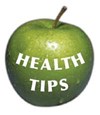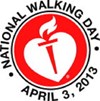Posted 4/20/2013
by www.extension.org

You’ve heard it forever: Drink eight 8-ounce glasses of water a day to be healthy. Do you really have to drink 64 ounces of water every day to stay healthy?
“No, not really,” says Susan Mills-Gray, University of Missouri Extension nutrition specialist. “We take water in so many different ways each day that most of us get enough liquids if we’re making quality beverage and food choices.”
Posted 4/20/2013
by www.extension.org

Often we go through our days without much thought as to what we eat and how we move. Living mindfully means paying attention to the events, activities, and thoughts that make up our daily lives. It means doing things on purpose, not just going through the motions of how we have always done things. Living mindfully encompasses all aspects of our lives and can help us eat healthy and be more active.
Posted 4/13/2013
by Gayle Coleman, University of Wisconsin Cooperative Extension

We know that not smoking, being active and making healthy food choices are good for our bodies. But what about our wallets? Research shows that healthy habits can save us money.
Gayle Coleman, nutrition education specialist with Cooperative Extension Family Living Programs, offers 10 tips for increasing your health and wealth in 2013.
Posted 4/13/2013
by LSU AgCenter

Many people likely think that excessive eating and zero exercise are the sole culprits for weight gain. The reality is that as few as 100 calories a day can make a major difference in weight gain or loss, according to LSU AgCenter nutritionist Dr. Beth Reames.
Posted 4/6/2013
by Centers for Disease Control and Prevention

When it comes to eating, we have strong habits. Some are good ("I always eat breakfast"), and some are not so good ("I always clean my plate"). Although many of our eating habits were established during childhood, it doesn't mean it's too late to change them.
Making sudden, radical changes to eating habits such as eating nothing but cabbage soup, can lead to short term weight loss. However, such radical changes are neither healthy nor a good idea, and won't be successful in the long run. Permanently improving your eating habits requires a thoughtful approach in which you Reflect, Replace, and Reinforce.
- REFLECT on all of your specific eating habits, both bad and good; and, your common triggers for unhealthy eating.
- REPLACE your unhealthy eating habits with healthier ones.
- REINFORCE your new, healthier eating habits.
Posted 4/6/2013
by University of Wisconsin Extension

About one of every eight children is overweight or at risk of overweight and the number of overweight children continues to grow.
It may be difficult to tell if your child has gained too much weight. Growth in height and weight don't always happen at the same time, so a child's heaviness may simply mean that he or she is getting ready to grow taller.
Posted 3/30/2013
by Cindy Bryson, University of Nebraska-Lincoln Extension

April 3, 2013 is the American Heart Association’s National Walking Day and a nationwide call-to-action for Americans to adopt a healthy lifestyle.
Physical inactivity increases the risk of coronary heart disease. Luckily, this is a modifiable risk factor and improving it is as easy as going for a walk most days of the week. One of the most effective forms of exercise to achieve heart health is walking.
Posted 3/29/2013
by North Dakota State University Extension

Some days you can’t get the food on the table fast enough. On those days, consider “speed scratch” cooking methods when time is short and your family members are sitting at the table with their knives and forks in hand.
Speed scratch is a term used when you combine ready-to-use fresh foods (such as salad in a bag) with packaged foods (such as taco kits).
Posted 3/27/2013
by Partnership for Food Safety Education

If you are dyeing eggs for fun and for hunting keep in mind these basics for safety:
- wash hands with warm water and soap before and after handling eggs
- use only eggs that have been refrigerated and discard eggs that are cracked or dirty
- after hard cooking eggs, dye them with food-safe coloring and return them to the refrigerator within 2 hours
- for a hunt, eggs should be hidden in places that are protected from dirt, moisture, pets, and other sources of bacteria
- total time for hiding and hunting eggs should not exceed 2 hours
- "found" eggs must be washed, re-refrigerated and should be eaten within a week
Posted 3/23/2013
by Source: www.extension.org

Using nonnutritive sweeteners as part of a healthy diet have several advantages. They offer consumers a way to enjoy sweet foods and beverages with little or no calories or glycemic response. They can help with weight management, control of blood glucose and prevent dental caries. For some consumers, they are a welcome alternative to sweeteners that have calories, but are they a good way to manage weight?
















